Following the first ever edition of Mutations Festival, our team of writers look back at a wild weekend in Brighton…
Day One – Alex
Mutations does exactly what it says in the tin: a changeable and flexible line-up, smeared throughout Brighton. At times I was mostly in it for the food, but that’s a coincidence; the music was largely incredible and I can’t remember feeling more content.
The first day was weird though. I think there were some odd scheduling decisions that basically made Saturday feel a lot tamer than Sunday. Having the club night portion on a Sunday night felt particularly unusual, as well as not offering an ear-thumping option on the Saturday night, but we’ll get to that. It’s really picking holes in an impeccable line-up – the value for money here was incredible, and that shouldn’t be ignored.
Anyway. Saturday for me was focussed around Willis Earl Beal. He was the second thing I saw but he stuck around with me all day, for a number of reasons.
He’s an incredible stageworker, selling the lo-fi midi strings of his iPod accompaniment with an absurdly intense vocal style. More gospel than soul. More spiritual than gospel. More soulful than holy. Every line oozed atmosphere, power, heartbreak and a tinge of madness. Everything was sculpted to increase the intensity.
But the most intense thing was the awkwardness and worry he inspired. I hope it’s a stage persona, but I’m genuinely still not sure. Willis asked the crowd not to clap between songs to ‘make everything as awkward as possible’ and possessed the authority to do so. Hunching over himself, wrapped in a tattered flag of his own design and with a blacked out eye-mask turning him faintly monstrous, he almost broke down with every song. Rants about cliche, or feeling empty, worrying he got off the wrong train and was in Hallowe’en. His final a capella never finished, as he appeared to burst into tears during the closing moments. He apologised for not being good enough to finish, and called himself Barbra Streisand as he rolled off the stage, into the arms of an enthusiastic fan.
He wasn’t the only one that needed a hug.
It was pretty stunning though. Half an hour of overwhelming emotion tempered with fear, and without the catharsis of applause, it all knotted up inside you.
But the quality of the performance wasn’t the only reason he became the core of that day. It was actually one of his self-loathing rants, where he mentioned that “the way to get good at singing is to pretend you’re better than you are. Have you ever noticed that most singers think they’re better than they are? It’s the only way to get good.”
It’s fine advice, but god damn does it make you harsh on vocalists. And I already hate a lot of bands for focusing around weak vocals.
Anyway. That was in my head.
Before Willis was Widowspeak. I only caught the end of the set, and enjoyed the sultry Southern bar atmosphere, though was mostly distracted by the particular childlike vocal construct Molly Hamilton adopted. Softer and less likely than her intersong chatter, it all felt a little Santa Baby. I’d heard it before. It’s an odd one. The performance was solid though, voice and music enveloping the room in a cloudy haze of smoke.
Then Willis, and a march over to the Old Market, which never quite filled up (I’m vaguely worried for One Inch Badge; they put on a great show, but that first day was empty enough that I’m not convinced they sold out) but then, there wasn’t much particularly impressive to see.
The end of Nature Channel wasn’t strong enough to pull me out of a nice sit down in the bar. I tried a bit of Chastity though, only to find the perfect example of Willis’ complaint. An accomplished and fairly precise (if not exactly original) metal backing track with a singer who thinks shouting aggressive absurdity is enough to make you a metal performer. To make it worse he was off the stage, pushing his face up against the small crowd that could actually be arsed being in the front row. It was more awkward than intimidating, and not the artful awkwardness Beal had managed. Closer to when you press on a toilet door and it slams back at you in embarrassment.
A break for the best falafel in town (still Casba, on Western Road) meant I missed most of Written in Waters. Here was a vocalist living up to their promise though. I think the ‘pretend your better than you are’ trick is probably a legitimate piece of advice, and here was someone willing to belt it out theatrically. The highlight of the short portion I saw was a vocal flourish that appeared to be wrapped in a yawn.
Unfortunately the backing band didn’t quite live up to it. Interesting enough sounds, but when a song attempts the ‘beat-long pauses in the midst of the music’ thing, it’s got to be very precisely perfect, and it wasn’t. It’s a jarring thing to miss, and really harmed the atmosphere. I’d actually quite like to see Written In Waters’ vocals on Chastity’s backing track. Although when I explained this to Monitors editor Kier as ‘theatrical bombast on top of carefully precise metal’, he pointed out I was looking for Paramore.
I think Written In Waters will do well though. A bit of honing and they’ll be a very appealing proposition. It’s worth noting that when I suggest the above exchange programme to Anna (compatriot, gardener, and arguably the nicest person in Brighton (a town the editor claims ‘actively makes people nicer’)), she says I am definitely wrong: “Chastity were tedious, and Written in Waves were wonderful.”
Next was Chelsea Wolfe: basically a statue carved out of ice, steel and the eyes of some vulpine deity, surrounded by mountains of crushing noise. The sudden leap in quality is tremendous. Here every note was immaculate, every tone sculpted. It was the first time I was forced to close my eyes to give myself totally to the sound. Perfect gothic vocals tempering ecstatic feedback and walls of intricately simple, pulsing bass.
Chelsea herself seemed to melt over the course of the show, from an ominous terrifying slab of ice into a warmer, more humane form, but the music just got louder, more concrete and more encompassing. There’s a real joy in letting your ears explore the depths and harmonics of incredibly loud, slow bass and guitar. The way pitches seem to slide around each other within these essentially static masses is perpetually mindblowing. I was surprised that this was actually the only time I really heard this as the focus all weekend, and I’m very glad it was there.
Essentially, we’re looking at a faster paced (within given margins) variant on Sunn 0)))’s enormous towers of noise, with the grim theatrics overtaken by actually engaging vocal lines. It’s an immaculate offering, and essentially sold the whole day to me.
Which was kind of the problem.
Post Chelsea, there was a clear acknowledgement from the people I spoke to that nothing could adequately follow that. Those with the more delicate sensibilities had already decamped to All Saints Church for Neko Case, but the people who wanted to carry on getting their soul pounded had nothing to do but get drunk.
It was a sense of duty to the readers (and a desire to look at a big church) that made me make the trek over to Josh T Pearson’s set.
Dear reader, I couldn’t manage it.
We settled into a slightly skewed sofa, in a tucked away apse, and watched as the cowboy-hatted troubadour tried to find the back-feeding harmonics of the enormous and gorgeous building. Once he resolved it, he started in earnest.
Oh my god, so fucking earnest.
The guitar was lovely, and echoed pleasingly around the space like an ocean of calm. I could’ve probably sat entranced by that for quite some time (a brief thought that maybe Sir Richard Bishop would be the one I’d want to see in that venue, although perhaps that would been bordering on sacrilegious). Yet his big cowboy hat and his big cowboy hat emotions could not reach me after the blissed out immensity of the Wolfe.
Two or three songs in, his opening line was a repeated ‘we almost had a baby’, which I’m sure tells a terribly tragic tale, but felt like having my heartstrings scraped raw by a nursery rhyme. I made eye contact with my team, and we almost wordlessly got up to leave.
Reports from Jake, (compatriot, former line manager and shaman – see below) held that the rest of the set was incredible, a magical journey that got more and more overwhelming. I think I’d have wilfully pierced my own eardrums if I’d been made to stay. Different strokes, I guess.
I saved my eardrums and my energy for the next day, and tried to get to sleep, ears still ringing from Chelsea Wolfe. Sunday would be different.
Day One – Jake
Willis Earl Beal
Willis Earl Beale climbs to the stage at the Hope & Ruin resembling a neurotic Zorro knock-off replete in black cape (actually a sheet) resplendent with his logo (think the Nirvana zonked smiley taken to its logical conclusion). The look is completed with black eye-mask and matching fedora hat. Instantly impressed with the sartorial effort, it quickly becomes apparent that this will be a performance of many contradictions. Immediate stage banter is self-deprecating, darkly ironic and slightly unnerving. Two caveats are issued before he starts: 1. No applause between songs; 2. Feel free to fall asleep as it will be gratifying to know you got some rest.
Beal’s backing tracks come from what looks like a small MP3 player and sound like cheap MIDI strings with occasional electronic textures and low-key rhythm. It’s essentially an ambient backdrop for his vocals, performance art and edgy stand-up shtick.
And what a voice. Despite disclaimers that “anyone can sing, just think that you can,” it’s apparent that this man is a fine singer, something of a golden-larynxed soul man that, whilst declaimed as cliché, is actually rather moving. WEB’s philosophy seems to be that this is nothing, we are nothing, and anyone can do this, when quite clearly this is not the case. An elaborate joke, a foolish prank? I still have no idea, but I found the spectacle mesmerising. This guy has moves as smooth as his voice, and I like the air of malevolence he creates with the ever so slightly uncomfortable humour that comes through.
The last song is announced, at which point the audience can’t resist clapping. Quick as a shot he retorts that this announcement got the biggest response. We chuckle, again. An encore is demanded and delivered a capella. And he’s gone.
Chelsea Wolfe
There’s a lot of hype surrounding Chelsea Wolfe right now. Her gothic interpretation of doom metal has found an eager audience and critical acclaim. To my damaged ears it sounded a little too airbrushed, too slick. The sound is undoubtedly immense and all the right frequencies are delivered. Bowel quaking distorted lows – yes. Wolfe looks the part too – gothic priestess with a spell of darkness to share with the faithful.
However, one crucial lesson has not been learnt from the obvious doom influence – and that is groove. A killer doom metal outfit (Bongripper for instance) will use the huge chunks of sound generated by the monster riffs and down-tuned guitars to create rhythmic motion that commands you to respond physically. This was absent from Wolfe’s set, which to my ears sounded as flat as a wall of grey slate, leaving no room for manoeuvre.
Josh T. Pearson
There’s a camp-looking cowboy setting up onstage bedecked in gleaming white jeans, matching Stetson and black leather jacket. It’s Josh T. Pearson, whom I had not heard of till this weekend, but a quick check on t’interweb reveals the man has heavy duty artistic form.
It takes a little while to get the sound right thanks to the church venue’s unwillingness to accept a soundsystem into its space. JTP has a disarming affability that keeps the mood good while the sound gets sorted. I’m warming to the dry humour and Texan gentleman persona immediately.
Finally he starts with some deeply personal, revealing songs that he admits are painful. The finger-picked guitar is a shimmering counterpoint to his country-folk vocals. It’s a somewhat earnest start to the set, but I’m always a sucker for straight-from-the-heart baring of the soul when in service to catharsis and transformation.
The vibe of the set lifts as it unfolds though, JTP introducing his buddy Calvin to the stage to join him with vocals and guitar in some interpretations of old Pentecostal hymns. Things really take off right here: the sound is exquisite and I’m reminded of how the simplicity of vocal harmony can really transport. It’s a sound that’s so old it’s timeless, and the clichés of Jesus offering redemption feel real and true, even to a cynical agnostic like me.
I feel elated, blissful and lifted by the end of the set. A beautiful reminder of what the right delivery of frequencies flying through the air can do to a person. Lightning Bolt will achieve the same effect tomorrow night using entirely different tactics, but that’s another saga…
Day Two – Alex
Kier (compatriot, editor and slacker) appeared around lunchtime, just in time to miss breakfast at Wai Kika Moo Kau. I filled him in on the previous day’s proceedings, and we wandered to the Hope & Ruin to make a start on the day.
We caught the end of Wild Cat Strike, and for an opening act it was incredibly promising. We walked into a wall of feedback and guitar jostling, and I was immediately engaged. Sadly it all went a bit unexpectedly Mumford & Sons (again, a singer with a very specific and familiar vocal tic, totally unlike their spoken voice), but did eventually pick up the pace again.
Their last song was stunning though. It started with the Mumford voice but made an absolutely pitch-perfect transition back to sonic experimentation, as the bass player stepped away from a brief dabble on a slide guitar and used his bass to pull the music upwards and outwards. Really dazzling stuff actually, not was I was expecting. A great start to the day.
Next up was supposed to be Vision Fortune, but a last-minute cancellation meant we were freed up to follow a hot tip from Enrique (compatriot, board gamer and lover of women) to check out Merlin Tonto. We arrived at The Albert some distance through, but were immediately treated to more unexpected spectacle.
I saw it as a glimpse into an alternate universe where instead of rock boors talking about how everyone who bought the first Velvet Underground record started a band, it was actually Jean Michel Jarre who inspired this intensity. Seriously, the world needs more synth-based garage bands, as this was a treat. The noodling Field-esque synth, minimalist yet playful bass, and stoic drums were a real treat, especially from a band with such a godawful name.
They even managed to hang together as an utter treat despite technical problems (initially, I thought, intentional clipping) scuppering one of the tracks. I genuinely worried that the drummer was going to cry as he waited for his cue on the next track, but once they were going again all was immediately forgiven and forgotten. Stunning stuff, really.
Stumbling back to the Hope & Ruin, we had time for a pint and a vegan brownie. The brownie was like eating a cloud made of chocolate and black holes. Somehow simultaneously the densest and lightest thing I have ever eaten. I worry that the Beelzebab kitchen at the Hope are actually toying with the laws of physics.
Tasted good though.
Upstairs for Dan Friel, and something I felt a little ambivalent about. On one level, it was incredible. A death metal Japanese arcade machine, his lapboard arrangement of casio, MPC (or near enough) and effects pedal basically blasted out enormous and tumultuous roars of electronic noise. Most interesting was the clear and intentional poaching of anthemic stadium rock dynamics, repurposed for elegiac electronic purposes. Entrancing, overwhelming and really bloody good.
But over time I got slightly bored of the same melodic synth sound. I guess this is a requirement of the live performance (not having time to play with the settings) but there was a sameyness that seemed a shame when the first impression was one of sheer originality. Would definitely Dan Friel again though, don’t get me wrong.
I was getting tired (my early night didn’t run as early as I’d hoped) so I was actually quite glad that Ought was near impossible to get into, the first time a venue appeared to have been miscalculated for the audience (apart from in the other direction). Kier apparently got pretty sweaty in the scrum, while I sipped a coke and listened to people complain about Naytronix and Ought (conflicting reports on the former from Enrique and Anna, and the latter from Enrique and Kier). I was quite happy to chill out a bit. Ought sounded okay from where I was sitting, but didn’t inspire me to battle through the crowd to get a better ear. Nae bother.
Next up was a trip right across the city centre to the Haunt, for Blanck Mass. I made it to the front of a pretty crowded room and tucked myself to the side, where there was actually a bit of room. Venues and crowds need to learn to negotiate better. Kier went to the loo and was unable to make it back.
Anyway, this was an absolute stormer from my point of view, but then it did seem tailor-made for my sensibilities. I’ve not actually heard the record yet (often if I know a gig is upcoming I’ll avoid the album to see the live show first, out of a conviction that I don’t actually hold with, that the live show should be the more engaging production… such nonsense), but this totally blew me away.
He pulled the lazy DJ trick of basically just interlocking songs by playing loud unintelligible noises over the outros and intros, but on a line-up where walls of noise and the word ‘overwhelming’ are key touchstones, this seemed legitimate. The blank masses of noise were perfect too, overpowering and satisfying and just on the border of scary. The soundsystem was able to put up with the sheer weight of them, and I felt pounded. The shifts between raw noise and brutalist techno were a little contrived, but everything was unrelentingly loud enough to support it.
It was the sequence built around single ‘Dead Format’ that got me though. Something about those plastinated ’80s shrieks and that irresistible drum clatter got right into me. I found myself writhing like a trapped snake. The sound begged me to shut my eyes and give myself over again. It all flowed through me and felt like, completely unstimulated, I was on that mythical perfect mix of MDMA and shrooms. A hallucinatory force, pushing through me and radiating through my body. That moment when dancing stops being about movement, but just about sound.
Pretentious, yes. But raw and powerful as anything you’ve heard, and my absolute highlight of the weekend. Fifteen minutes of angry, hard-edged bliss.
The crowd thinned (and then thickened again) and I ended up perched louchely on a shelf for the stoner rock of OM. Here I was mostly interested in how integral bass is to the metal structure. I think I’d lacked an awareness of how big a part of those walls of noise the bass is, and it was OM and Wild Cat Strike that firmed it up in my head.
OM’s utterly bass-centric production was pretty wonderful, although it was only after I stopped analysing that it really got me. Engrossing, but I probably could’ve done with either fifteen minutes less or about three hours more. And again, I ended up stoned without being stoned, which is a pretty impressive.
Timing wasn’t how we thought it was, so we had to rush to Concorde 2 via some fast-paced chips from Harry Ramsden’s (solid, overpriced chips those). We got there just in time for Lightning Bolt.
Chaos. Delightful, raucous chaos. I stayed clear of the moshpit but was quite pleased to see an old uni friend and his brother get hauled out by the drummer for being ‘bad guys’. James (compatriot, father and bad guy) later explained that he had actually been trying to stop someone photo-blogging from the moshpit, which seems pretty reasonable actually, but he was definitely drunk enough to be an untrustworthy source.
Anyway, it was accomplished guitar and drum work, completely undermining my earlier realisation about the reliance of metal on bass. This racket was created from the simplest tools, played at the fastest possible tempos. Real masters of craft, those two. Stunning.
Too stunning, in fact, as they made last band of the weekend Metz seem restrained and laid-back in comparison, despite their perfect dynamics and supremely tight playing. Kier and I settled into chairs at the back, and I briefly got a flash forward to the pair of us in an old people’s home, still listening to metal. Is it wrong to call metal cozy? It was really comforting, their final mass of noise feeling a bit like being surrounded by a stadium-sized chorus roaring their support. It’s amazing what a guitar can do.
And here the other side of the scheduling problem kicked in. After a day of implacable heaps of noise, it was hard to tempt people who had work in the morning to the closing club night of the festival. The promise of John Talabot and Tourist wasn’t really enough for many, so it was a fairly quiet affair, barely half-filling Patterns.
Both acts took too long to get going, seemingly unaware that people had been hard at work on their earholes all weekend, and were probably already ready for some dancefloor release. Both started with tame house, and only got going after a solid half-hour. This was a much bigger problem for Tourist, who only played for forty-five minutes.
John Talabot was back-to-back with local DJ Leon Vynehall, but they both seemed to slow each other down rather than goad each other upwards.
Once it opened up though, it finally hit the spot, and kept the enthusiastic crowd moving long into the night. My favourite bit was (obviously) the disco-infused portion, kicking out from a fairly restrained Todd Terje mix into some lovely guitar, vibraphone and slap bass pieces. I think a big part of my passion for disco is the range of acoustics brought in by the non-electronic instrumentation. It’s often an energy that needs to be brought in, I wish people would go for the jugular with it more often.
We survived to the end. Barely.
Quite a weekend. For all the complaints about scheduling, the overall arc was fantastic. I was glad to have an excuse to leave early on the first night to conserve energy for what was always going to be the more impressive Sunday, and between Willis and Chelsea there was some truly stunning stuff on the Saturday.
But Sunday was just immaculate. Plenty of range, shockingly high quality (at least the route we picked through), and a great crowd of really passionate people. While the end of Sunday was a little bit drunken for some, for the most part people were clearly really there out of a passion for the music, and it showed in the crowd reactions. Everyone had an opinion to share and mostly it was: ‘that was fucking incredible’.
A hard weekend to top. Not perfectly curated, but not far off. A real set of journeys.
I’m off to collapse in a blissed-out mess.
Wake me in the new year.
Day Two – Kier
As an editor/slacker (one who has just realised that this review is already over 4,000 words long), I’m going to try and keep this short; especially as Alex has already done such a grand job of summing up the festival as a whole. Nonetheless, some of the bands at Mutations deserve some double credit.
The first are Merlin Tonto. Despite their technical problems, and the fact I entered their gig full of disappointment after Vision Fortune’s cancellation, this somehow ended up one of my favourite performances of the festival. A mesmeric, engrossing wash of synth minimalism, Merlin Tonto played Head Music that showed an assured understanding of the value of restraint. It’s always great to make a serendipitous discovery at a festival, and I can’t wait to see these guys again – I could’ve listened for another hour.
Ought were vying with OM for the band I was most looking forward to seeing, and judging by the way the crowd spilt beyond the Green Door Store curtain, the same could be said for several others. The first half of the set was spent craning my neck from the back of the room, from where I mainly noticed three things:
1. Frontman Tim Darcy not only sounds like a young Mark E. Smith, but looks like one too.
2. Drummer Tim Keen’s jealousy-inspiring talent is much more obvious when you see Ought play live.
3. There was an unexpected (and not entirely unpleasant) Strokesiness to certain tracks, which had hitherto passed under my radar.
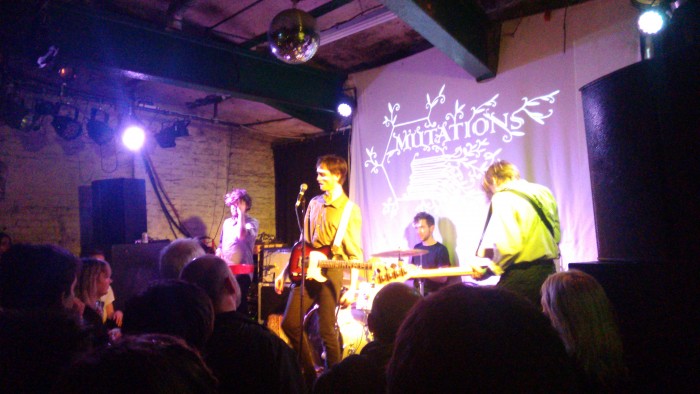
At this point I was lucky enough to bump into a hungover FVC and her lovely, burger-munching boyfriend Richard, who soon dragged me to the front. For which I owe them much gratitude, as it was the perfect place to witness the band perform ‘Beautiful Blue Sky’, a track I’ve ranted about on The Monitors a number of times but just seems to get better every time I hear it. Darcy’s performance on this and ‘Celebration’ was smirkingly perfect too. Top stuff.
Blanck Mass was as monumental as Alex already said, although unfortunately I saw it from the uncomfortable kernel of a crushed throng near the toilets. This wasn’t too annoying, as I’d luckily already seen him support The Notwist earlier in the week, and the position did at least allow me a full view of the psychedelic endoscopy that formed one of the accompanying visuals. Yeah, cheers for that Blanck Mass. As one poor soul behind me involuntarily exclaimed, “oh god, no!”
Mutations could’ve ended immediately after the blissful bass massage of OM and I would’ve been satisfied; frankly, after that, anything else was a bonus. Lightning Bolt turned out to be a pretty big bonus – like getting the bonus ball on your lottery ticket and then finding an identical lottery ticket on the street just after collecting your winnings. I’ve generally admired rather than loved Lightning Bolt’s recorded output, but live they were momentous – so good they even reminded me of Boredoms at times.
Alex rightly pointed out the jazzy elements of Brian Chippendale’s furious drumming, which reminded me of an old Simpsons comic where Lisa accidentally invents a new genre of music combining speed metal and jazz, quickly dubbed ‘Spazz’ by the media (I’m not making this up – apparently the word is less offensive in the States). Anyway, I didn’t know about Lightning Bolt when I bought that comic aged 13, but I’d like to think this is what Spazz would’ve sounded like.
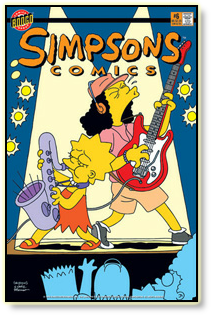
Alex’s part of this review nails the closing club night both in terms of scheduling and content, so all I’ll add is that they managed to keep me, someone who rarely gets his wriggle on, dancing till past 2am, so they must have been doing something right.
Mutations also seemed to be doing something right. Despite some niggles, which seem inevitable during an inaugural event, it provided a ridiculous amount of head-melting, belt-shaking performances (and I only bloody saw half of them). Let’s hope next year’s edition boasts a similarly fascinating sequence of musical DNA…
Photos from Day One by Mike Burnell
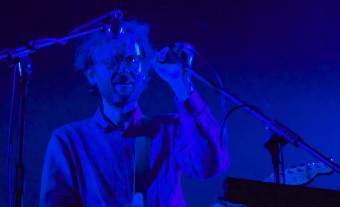


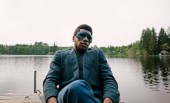
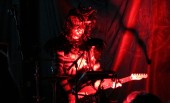
Follow us
Follow us on Facebook Follow us on Twitter Follow us on Google+ Subscribe our newsletter Add us to your feeds